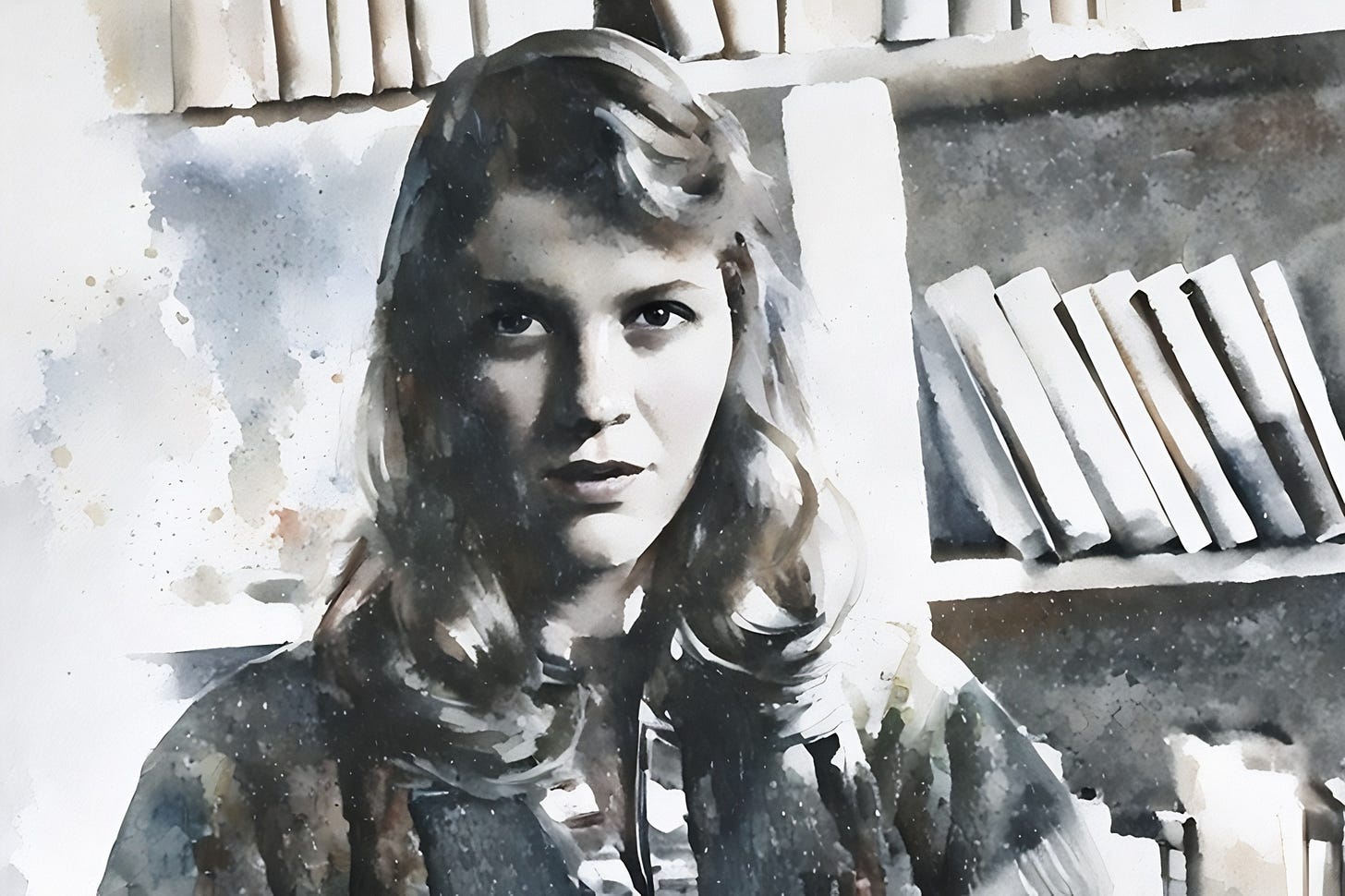Sylvia Plath & the hardest part of writing
Let me live, love, and say it well in good sentences― Sylvia Plath
I read a Note the other day that said writers shouldn’t be expected to show up on schedule because the muse doesn’t work that way and I laughed.
For a minute, I thought about leaving a comment saying hey, why not write when you want and just schedule? But maybe it was just an off the cuff frustration and anyway, no one likes Corrector McGee pointing out logic (or typos) in public so I didn’t.
But it made me think. Because there are always hard parts. No matter how much we love a thing. Doesn’t matter if it’s writing or what it is, there are always hard parts.
I’m working on a tribute to Sylvia Plath.
This might seem irrelevant, but I promise you it’s not. Cross my heart.
It drives me a little crazy that so many people view her work through the lens of how her life ended. Because she was so hopeful, right until that one black moment.
God, it had been a time. Coldest winter in a hundred years and the water pipes in her flat kept bursting. Her husband was having an affair and left her for his mistress. And before he left he called her an ugly hag and told her he wished she was dead.
And she was broke, taking writing jobs to make ends meet but laughing about it.
Then she found a stack of poems in his desk. Poems inspired by his lover. Speaking of his lover’s beauty and comparing her to the hag that is his wife. Wishing his wife dead and I can’t imagine how it felt to read those, maybe wonder if he’d publish them.
She said the worst part was that they were good. So good. Even though they painted her the villain, they were beautiful writing and as a writer she saw that.
So she wrote a letter to her mama and said she’s going to be okay. She’s going to make it through this and learn to stand alone. She called her doctor and asked if they could find her a bed, just for a little bit. Until she could cope. But there were no beds.
And the next day, there was no Sylvia.
She left her last manuscript finished. Ready to publish. She’d arranged them so they started dark and ended on a hopeful note. Spring is coming. Is how it ended.
But he rearranged them. So they started hopeful and ended on a black note. And it colored how the world looked at her forever. Look how black her last book ended, and then she took her life. Poor little bird. Poor broken girl. Poor Lady Lazarus.
The edits he made are probably part of why she rose like a phoenix from her grave. Won a Pulitzer posthumously. But the story he sold wasn’t true. It wasn’t her story.
Her story was one of hope. Right until that last terrible morning.
What much of the world doesn’t understand is that people who suffer with depression and suicidal ideation hold life so dearly. Maybe even more than most of us who take life for granted. Wanting so badly to stay alive. Fighting for life, writing to her mama, writing to her psychiatrist, calling the doctor to say please help I want to live.
Here’s the takeaway, at least for me.
He rearranged her words and forever colored what the world thought. Because the order we put words in matters. It’s maybe the hardest part of writing.
When I write, the words come out in a flood. But they’re almost never in the right order. And then I have to figure out the correct order. Arranging and rearranging to see if they feel right. Liz Gilbert once interviewed a poet who said her poems often show up backwards. Like she caught them by the tail and has to rearrange them.
The order of our words matters. Because they paint a picture and we want them to paint the right picture. How else can people understand what we’re trying to say?
I don’t struggle to write on schedule. To me, it’s like a silent little gratitude practice. You know? It’s like saying hey, I appreciate you so much, you can count on me to show up faithfully every Tuesday and Friday and I hope I can share a thought you resonate with or maybe inspire you in some small but meaningful way.
But getting the words in the right order? That’s the hard part.
I hope I did.
“Let me live, love, and say it well in good sentences”
― Sylvia Plath, The Unabridged Journals of Sylvia Plath



Thank you for this. For saying something that needed to be said. For breathing life back into someone who has become a model of death. I had never known her life was rewritten to suit someone else's vision.
Thanks for clearing up the rearrangement of her work. I love her poetry, and wasn’t aware of how she struggled to find help.